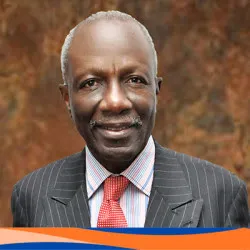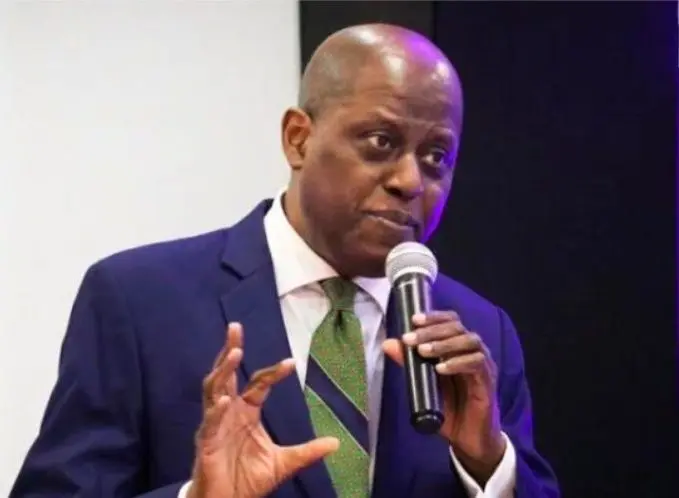Featured
Increase In Minimum Capital Requirements For Nigerian Banks

It is self-evident that whatever the Governor of the Central Bank is doing (or not doing), the backing (and banking!!) of the President is critical.
On that score, President Bola Ahmed Tinubu did not pull any punches when he spoke at the Hague, Netherlands during the business session of the bilateral meeting with the Dutch team, led by Prime Minister Mark Dutte.
“I am ever ready to take tough decisions in the best interest of the people, even if with initial pains.
I am a determined leader; I will continue to take the difficult decisions that will benefit our people, even if there is a short-term pain.
EDITOR’S PICKS
I am unafraid of the consequences once I know that my actions are in the best long-term interests of all Nigerians.”
Hence, we must recognize the over arching influence of Mr. President in economic, financial and political matters.
When he was sworn in on 29th May 2023, he released an unscripted bombshell while delivering his inaugural address at Eagle Square, Abuja: Shortly afterwards, he spilled the beans in Paris while addressing Nigerians. According to AFP [AgenceFrancais-Presse]
“When I got to the podium, I was possessed with courage and I said fuel subsidy is gone. Also, no more parallel (black market) for dollars.”
On November 22, 2023, when President Tinubu addressed German-Nigerian Business Forum again he did not pull any punches:
“Nigeria voted for me for reforms, and from day one of my inauguration, I started the reforms.
To me if you didn’t mention me in the Guinness Book of Records, I’d strive to find a way to insert myself because I did it without expectation.”
The endorsement of the IMF [International Monetary Fund] followed on February 14, 2024.
“The new Tinubu Administration has made a strong start, tackling deep-rooted structural issues in challenging circumstances.
Immediately it adopted two policy reforms that its predecessors had shield away from: fuel subsidy removal and the unification of the official (dollar/naira) exchange rates.”
Front page editorial of “Nigerian Tribune” newspaper.
Headline:“BRIBES : TINUBU’s CHARGE TO INVESTORS”
“President Bola Tinubu recently set tongues wagging when, during his just concluded trip to Doha, the Qatari capital, he told the country’s captains of industry to report directly to him if any Nigerian official demanded a bribe from them in order to facilitate a business transaction.
Revealed in a signed statement by Special Adviser to the President on Media and Publicity, Ajuri Ngelale, the president’s message to Qatari investors at the Nigeria-Qatar Business and Investment Forum could not have been clearer:
“Do not offer a bribe to any of our people, and if it is requested or taken from you, report to us. You will have access to me.”
Eager to drive home the point that the country is open to business and will adopt a business-friendly approach on his watch, he added:
“Whatever is the obstacle or problem that some of you might have experienced; it is in the past because there is no obstacle in the future.
We are removing obstacles today, and we are going to continue to remove all obstacles. We have done so much within nine months. And I assure you, it is free entry, and free exit.
Your funds will flow smoothly into and out of our country. Bring your investments.”
Finally, he urged Qatari investors not to allow “perceptions” about the country to “become a hindrance to [their] will to invest,” since “Nigeria is serious about revolutionizing investment promotion.”

We could not be more delighted to read this promise of radical transparency from the president since, at the very least, it shows that he is not unaware of the tremendous odds typically faced by any entity- individual or corporate- seeking to do business in Nigeria. While, as the president mentioned, corruption is the most significant among these challenges, it goes without saying that it is just one of many tangible and intangible obstacles to investment.
Accordingly, not only do we welcome the president’s statement, for nothing could be more timely, we urge him to do everything within his capacity to ensure that the book is thrown at whoever flouts it, no matter how highly placed such a person is in the current administration.
In other words, nothing is more important than the president backing his rhetoric with action, for understandably, many Nigerians are bound to sneer, saying that they have heard such soaring rhetoric before and that when the time came for egregious misdemeanors to be punished, the government lost its nerve.
Since such skeptics have a point, the task before the president is to show that their skepticism has no basis, and that he will let the hammer fall on whichever official demands inducement to do their job.
Until then, he can, as a matter of fact, do something about the current situation in the upper legislative house, where rumours of budget-padding and dubious awards to senators have cast a shadow upon the integrity of the lawmakers.
If the government is truly interested in fighting corruption, it can do no better right now than to act on the many cases of corruption dotting the landscape, including those affecting and relating to those within the inner circle of government.
This would send the right and correct signals that Nigeria is ready for positive change and a new approach to public life rather than following the usual ineffective and tawdry public assertions that mean nothing in reality.”
The Central Bank of Nigeria used to boast of an excellent Research Department with a world class library.
The King’s College Old Boys Association [KCOBA] would not take matters for granted. Here is a list of books which are to be delivered to the Governor of the Central Bank, Mr. Yemi Cardoso and Deputy Governor, Mr. Phillip Ekeazor (who are both old boys of St. Gregory’s College, Lagos:
From the archives we have the following vignettes:
(now known as First Bank of Nigeria Plc) was formed in 1894 among its founding shareholders was Dr. J.K. Randle. The inaugural meeting was held at the Colony Hotel, in London.

“Business Day” newspaper of May 8, 2024
Headline:“CHIKE-OBI CAUTIONS AGAINST POOR EXECUTION AMID BANKS’ RECAPITALISATION”
Mustapha Chike-Obi, chairman, Bank Directors’ Association of Nigeria, on Friday lauded the Central Bank’s latest bank recapitalisation policy but warned that poor execution could scuttle the gains.
Chike-Obi spoke at a roundtable assessing the bank recapitalisation policy organised by BusinessDay Media Limited in Lagos.
He noted the 2004/2005 recapitalisation exercise was a good policy but was poorly implemented due to governance issues.
The CBN on March 28 announced new capital requirements for Nigerian lenders from commercial to merchant banks.
The last such exercise was in 2004/2005, two decades ago.
During the recapitalisation of 2004/2005, a surge in liquidity occurred without adequate investment opportunities, leading to an asset bubble and subsequently the dismissal of several bank chiefs.
“A good policy that brings bad results means execution was problematic along the way.
We are seeing bad results from good policies and nobody is taking responsibility for that.
We should celebrate the policy and the results,” he said.
Speaking further, he said, “I encourage more engagement from the CBN, it’s better if they talk to the banks about why retained earnings are not considered at this point in time.
I think there should have been better engagement, some things need to be explained.
Why does an international licence require more capital than a national licence? If you’re diversifying across nations, does that mean more risk?
If I have one branch in London as Fidelity, am I in the same boat as a UBA who has many branches in many countries?” Chike-Obi, Chairman of Fidelity Bank Plc, said.
The CBN said all international banks should move their capital to a minimum of N500 billion; national banks up to a minimum of N200 billion; regional banks (N50 billion); merchant banks (N50 billion) and N20 billion for non-interest banks operating nationally and N10 billion for those operating regionally.
In his keynote address, Ike Chioke, Group Managing Director Afrinvest (West Africa) Limited, noted that “after the announcement of the last recapitalisation we had 89 banks operating with N311 billion total capital, which was equivalent to $2.4 billion at the time.
We ended up by December 31 2005 with 25 commercial banks each with a minimum of 25 billion and a total capital of N932.0 bn.
He said that commercial banks have a capital gap of N3.7 trillion to meet the capital requirements while the merchant banks have N200.6 billion.
There is some scepticism that banks will take on significantly more lending to the private sector once their minimum capital is raised given the risk in an economy battling with accelerating inflation and a severe cost-of-living crisis.
“We can still lend, but we’re limited in how much.
As a banker, it’s more attractive to buy Treasury bills at 25 percent than to lend to people,” Chike-Obi said.
“There’s a reluctance by banks to lend. I would have reduced CRR, and told banks they can’t buy more than 10 percent of T-bills. This will force them to lend to people.”
He also said the notion that banks give people money to buy FX is not true.
“People only buy FX because it makes sense to them. It’s a rational economic decision. What we have to do is to make it more rational to hold assets in naira than in dollars.
I’ll raise short term rates to 30%, and prevent banks from having more than 10 percent in T-bills.
What we have doesn’t allow growth and banks aren’t lending. I believe GDP growth will be lower in the fourth quarter than predictions.
The raise in capital is necessary because the FX adjusted basis has gone down. So, the recapitalisation isn’t as massive as it looks from the outside,” he said.
Front page of “The Punch” newspaper of April 22, 2024
Headline:The Institute of Chartered Accountants of Nigeria
Recommendations made by the Institute of Chartered Accountants of Nigeria on the New Minimum Capital Requirements for Banks in Nigeria: Our Position.
“Given the above, the following recommendations are made to ensure a successful implementation of the programme:
Frontpage of “ThisDay” newspaper of April 13, 2024
Headline:AUDIT REPORT: SENATE PROBING 774 FEDERAL AGENCIES OVER AUDITOR GENERAL’S QUERIES”
“The Senate is currently scrutinizing the financial records of 774 Federal Agencies based on the queries raised against them in the 2019 report of the Auditor General for the Federation.
The Chairman, Senate Public Accounts Committee (SPAC), Senator Aliyu Wadada, disclosed this yesterday in his Keffi, Nasarawa State, country home while speaking with journalists.
He noted that his committee was not out to witch-hunt anyone but pledged that members of the panel would discharge their responsibilities diligently in the best interest of the country.
Wadada, also disclosed that the 10th National Assembly with the support of President Bola Tinubu and critical stakeholders in the nation’s economy would soon embark on the amendment to the 2007 Procurement Act so as to curb financial infractions before they take place.
He nevertheless appealed to leaders at all tiers and heads of government institutions at the Federal, State and Local government levels to embrace the spirit of self-discipline and fear of God in the discharge of their responsibilities.
The Senator, who is representing Nasarawa West Senatorial District on the platform of the Social Democratic Party (SDP), said no matter how beautiful a law is crafted, it needed godly people to implement it.
Wadada said, “When I became the Chairman, Senate Public Accounts Committee (SPAC), I was emphatic on the need for President Bola Tinubu to appoint the substantive Auditor General for the Federation (AuGF).
“I even wrote a letter to that effect to the President and he responded by appointing a substantive AuGF.
The AuGF report for the 2020, 2021, 2022 fiscal years were not all ready. It was only the 2019 Auditor General’s report that was then ready for us to take actions on.
The Auditor General’s report for 2020 was ready at the time I became the Senate Public Account Committee but it could not be signed by the acting Auditor General for the Federation.
As we talk, the 2020 Auditor General’s report is ready and the substantive AuGF has appended his signature to it.
The development is a confirmation that the Presidency under the stewardship of President Bola Tinubu is available, is responsive and supportive of the Committee on Public Accounts in the two chambers of the National Assembly.
We have since started work on the 2019 Auditor General’s report before us.
Under my chairmanship of this sensitive and strategic committee, I have repeatedly said that we are not out to witch-hunt or pull down anybody.
Our ultimate objective vis-à-vis the primary focus of the committee is to ensure transparency and accountability in the management of public funds.”
Front page of “The Punch” newspaper of April 12, 2024
Headline:VIETNAM TYCOON SENTENCED TO DEATH IN $12BN FRAUD CASE”
“A court in Vietnam sentenced real estate tycoon Truong My Lan Thursday to death over her role in a 304 trillion dong ($12.46bn) financial fraud case, the country’s biggest on record, state media reported.
CNN reports that her trial, which began on March 5 and ended earlier than planned, was one dramatic result of a campaign against corruption that the leader of the ruling Communist Party, Nguyen Phu Trong, has pledged to stamp out.
Lan, the chairwoman of real estate developer Van Thinh Phat Holdings Group, was found guilty of embezzlement, bribery and violations of banking rules at the end of a trial in the business hub of Ho Chi Minh City, state media said.
We will keep fighting to see what we can do,” a family member told Reuters, speaking on condition of anonymity. Before the verdict, he had said Lan would appeal against the sentence.
Lan had pleaded not guilty to the embezzlement and bribery charges, Nguyen Huy Thiep, one of Lan’s lawyers told Reuters.
“Of course she will appeal the verdict,” he added, noting she was sentenced to death for the embezzlement charge and to 20 years each for the other two charges of bribery and violations of banking regulations.
Vietnam imposes the death penalty mostly for violent offences but also economic crimes. Human rights groups say it has executed hundreds of convicts in recent years, mainly by lethal injection.
The Thanh Nien newspaper said 84 defendants in the case received sentences ranging from probation for three years to life imprisonment.
Among them are Lan’s husband, Eric Chu, a businessman from Hong Kong, who was sentenced to nine years in jail, and her niece, who got 17 years.
Lan started as a cosmetics trader at the central market in Ho Chi Minh City, helping her mother, she told judges during the trial, according to state media.
She later founded her real estate company, Van Thinh Phat, in 1992, the same year when she got married, according to state media.
She was found guilty, along with her accomplices, of siphoning off more than 304 trillion dongs from Saigon Joint Stock Commercial Bank, which she effectively controlled through dozens of proxies despite rules strictly limiting large shareholding in lenders, according to investigators.
From early 2018 through October 2022, when the state bailed out SCB after a run on its deposits triggered by Lan’s arrest, she appropriated large sums by arranging unlawful loans to shell companies, investigators said.
The defendant’s action not only violate the property management rights of individuals and organisations but also put SCB under scrutiny, eroding people’s trust in the leadership of the Party and State,” state newspaper VnExpresscited the jury as saying.
The bank is currently propped up by the central bank and faces a complex restructuring under which authorities are trying to establish the legal status of hundreds of assets that were used as collateral for loans and bonds issued by VTP. The bonds alone are worth $1.2bn.
Some of the assets are high-end properties, but many others are unfinished projects. Before her fall from grace, she had played a key role in Vietnam’s financial world, getting involved in the previous rescue of troubled SCB more than a decade before she contributed to the bank’s new crisis.”
Front page of “Africa Voice” newspaper of 29 April, 2024
Headline:“PROF WINS TOP AWARD FOR ISLAMIC MORAL ECONOMY”
“Professor Mehmet Asutay has been selected as the first-place winner of the 2024 Islamic Development Bank (IsDB) Prize for Impactful Achievement in Islamic Economics and influential contributions to the field of Islamic economics and finance.
The prize laureate is a Professor of Middle Eastern and Islamic Political Economy & Finance at Durham University, United Kingdom.
He is an internationally recognized academic who produced pioneering and impactful scholarly works.
Professor Asutay was selected in recognition of his novel work on Islamic moral economy and the articulation of Islamic finance to be supportive of sustainable development and the welfare of human beings.
This year’s prize cycle aims to recognize, reward and encourage significant knowledge contributions in Islamic economics with the potential to solve major development challenges of IsDB member countries.
FURTHER READING
The prize comes with a US$50,000 award for the first prize winner, US$30,000 for second prize, and US$20,000 for third prize. However, the second and third-position prizes are withheld this year.
Every year the winners of the IsDB Prize are selected by a different committee of experts from outside the IsDB Group, whose work is coordinated by the Islamic Development Bank Institute (IsDB).
The winner of this year’s prize will receive the award during the IsDB Group Annual Meetings, scheduled for 27 – 30 April 2024 in Riyadh, Saudi Arabia.
In his comments on this occasion, the President of the ISDB, H.E. Dr. Muhammad AI Jasser, congratulated the laureate for his impactful knowledge contributions and wished him success in this various endeavours.
Acting Director General of IsDB, Dr. Sami Al-Suwailem, also congratulated H.E. Dr. Al Jasser for guiding the Institute towards the successful coordination of the prize.”
Click here to watch our video of the week:
Advertise or Publish a Story on EkoHot Blog:
Kindly contact us at [email protected]. Breaking stories should be sent to the above email and substantiated with pictorial evidence.
Citizen journalists will receive a token as data incentive.
Call or Whatsapp: 0803 561 7233, 0703 414 5611















